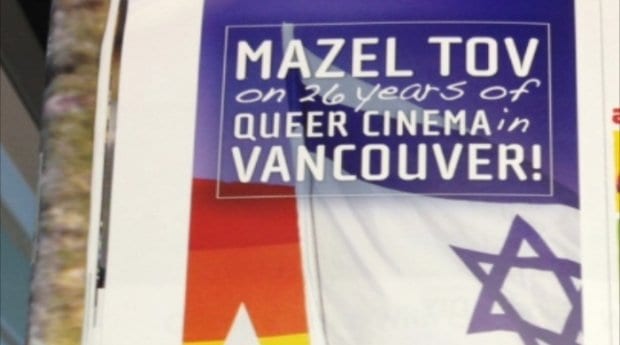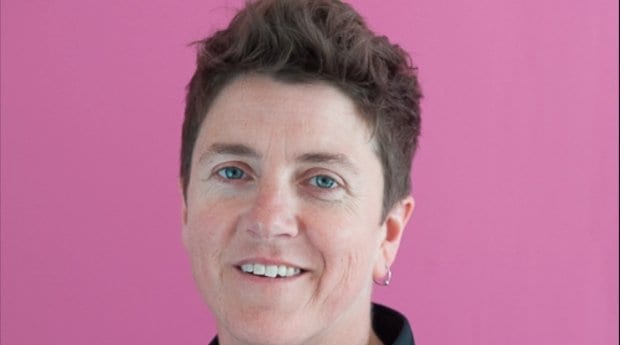
Credit: outonscreen.com
The director of We Don’t Want to Marry withdrew the film from the Vancouver Queer Film Festival program, citing the festival’s acceptance of advertising from a pro-Israel group, Yad b’Yad. Coral Short joins two other filmmakers — Can Candan (My Child) and Patty Berne (Sins Invalid) — who have pulled their films from the festival lineup over the publication of the ad in the festival’s guide.
As the festival drew to close, Salaam Vancouver, a queer Muslim group, and Trikone Vancouver, a queer South Asian group, withdrew as community partners of the festival because of the ad.
“As a queer organization and me as a South Asian queer I really don’t us want to be used to justify the settler colonialism in Palestine which is pink washing,” Trikone’s Fatima Jaffer told Xtra. “We need to make sure that our queer organizations know what’s going on so they know they are being used.”
Prior to the screening of the film, Quick Change, the festival’s director of programming Shana Myara read a statement from Trikone. It stated, “The South Asian Queer organization Trikone Vancouver, the community sponsor of Quick Change, has withdrawn its community partnership with the Queer Film Festival in solidarity with the people of Palestine, Gaza and support for the international call for boycott, divestment and sanctions against Israel.”
Salaam Vancouver’s Imtiaz Popat, who spoke briefly before the screening of Moroccan film, Salvation Army, stressed that his group is not calling for a boycott of the festival, but wants the festival to change its approach.
Myara noted that the issue sparked a lot of conversation at the festival and she urged attendees to provide feedback, which she said will be part of a deeper conversation festival leadership will undertake in the fall.
—Nathaniel Christopher
***
A second director has pulled his film from this year’s Vancouver Queer Film Festival (VQFF) over its decision to include an advertisement from a pro-Israel group, Yad b’Yad LGBTQ in the festival guide.
In an open letter to VQFF organizers Can Candan, the director and producer of My Child, says he withdrew his documentary because the festival has not taken a “public and vocal stand against the Israeli government’s unacceptable policies.”
“In light of the ongoing war against the people of Palestine by the Israeli government, we feel, as filmmakers and human rights activists with conscience, we have an obligation to come out publicly against the Israeli government’s policies and join forces with all those who oppose these policies by joining the Boycott, Divestment and Sanctions (BDS) Campaign,” writes Candan. “Since it is clear from the recent controversy surrounding the VQFF, the festival administration chooses not to take a public and vocal stand against the Israeli government’s unacceptable policies.”
This follows a decision by filmmaker Patty Berne to withdraw Sins Invalid from the festival.
In his letter, Candan makes references to Berne’s statement along with that of Simon Fraser Public Interest Research Group, Queers Against Israeli Apartheid, the Radical Access Mapping Project and Mik Turje, co-director of Hands in the Dirt who all expressed concern about Yad B’Yad LGBTQ’s ad.
In an Aug 18 statement executive director Drew Dennis says the festival does not expect any more changes to the program.
“While there are always lots of moving parts that make up Western Canada’s largest queer arts event, we don’t anticipate any additional program changes,” Dennis writes. “Audiences can plan their festival experience and stay up-to-date by visiting queerfilmfestival.ca”
VQFF says a second screening of the film Drunktown’s Finest will replace My Child in the same Aug 18, 9pm time slot, and that people who purchased a ticket can either receive a full refund or exchange their tickets.
Candan is offering free viewings of My Child to Vancouver audiences on the film’s website.
— Nathaniel Christopher
***
Thurs, Aug 14, 2:53pm PST
A filmmaker has pulled her film from this year’s Vancouver Queer Film Festival (VQFF), saying she is disappointed with the festival’s decision to accept advertising from a pro-Israel group, Yad b’Yad LGBT.
Simon Fraser Public Interest Research Group (SFFPIRG), a student-run social justice centre, Queers Against Israeli Apartheid (QuAIA) and Mik Turje, another director whose film is being screened at the festival, have also issued their own statements expressing concern about inclusion of the ad in the festival’s guide.
Such ads, they say, are part of a bid to “pinkwash” Israel’s image to distract attention from its treatment of Palestinian people and instead focus on the country’s gay rights record. They have variously called on the festival to apologize for including the ad, develop a policy about pinkwashing, adopt a boycott, divestment, sanctions (BDS) strategy towards Israel, and undertake self-education about Palestinian human rights.
“We were angered and disappointed to see the print ad accepted by the VQFF that attempts to portray the state of Israel as a friend to LGBTQ communities, particularly in the current moment as the people of Palestine are living through hell and dying in staggering numbers daily,” writes filmmaker Patty Berne, who withdrew her film Sins Invalid from the festival.
The ad is an attempt to “persuade LGBTQ people in other countries that the privileges enjoyed by queer Israelis are reason enough to be silent about the inhumane treatment of Palestinians of all orientations,” she says.
The festival says the film A Street in Palermo will replace Sins Invalid, and that ticket holders can either receive a full refund or exchange their tickets. Berne now plans to screen her film at Fletcher Challenge Canada Theatre, 515 W Hastings Street, on Aug 18 at 7pm.
Acceptance of the ad is not a signal that the festival has taken “a position about the Israeli/Palestinian conflict,” says executive director Drew Dennis in a July 28 statement on the festival’s website.
“The feedback we’ve heard loud and clear has highlighted for me that VQFF does not currently have an advertising policy equipped to deal with the complexities of this issue,” Dennis writes.
Asked if accepting the Yad b’Yad ad was discussed before it was included in the film guide, Dennis says the festival’s board and staff do not review every single advertisement before publication.
Dennis says the organization’s board and senior leadership team are undertaking a review to make sure its advertising and programming honour its mandate to celebrate queer lives through film. Much of that work will take place in the fall, following the festival, Dennis adds.
Berne says she appreciates the VQFF’s effort to think through what she calls its “organizational lapse,” and that it’s now trying to develop a protocol about the ads it accepts.
But, she says, the deeper issue is that community members have approached the festival before about its internal education on Palestinian human rights. She suggests that the festival’s acceptance of the ad seems to indicate that they have not engaged in those discussions.
“We do appreciate the work that they do, but I expect more from them,” Berne says.
Dennis says the festival has received a wide range of feedback about the complexities of the issue, and recalls that last year’s festival programming included a panel discussion entitled “Why and Why Not? Cultural Boycott?” that debated the merits of boycotting Israeli cultural products.
“This is a conversation that the organization has been having, and will continue to have,” Dennis adds. “I’ve been listening, and listening, and listening, to so many viewpoints. All of that is being tracked and will be brought forward into discussions in the fall.”
Dennis says the mandate of the organization is to bring communities together to provide a platform for safe, open and respectful dialogue and a diversity of viewpoints.
Dennis is disappointed that Berne pulled her film from the festival and says the invitation to screen Sins Invalid still stands.
No other directors have indicated they will withdraw their films, Dennis tells Xtra (which, full disclosure, ran a similar Yad b’Yad ad in its July 31 issue).
Turje, co-director of the short Hands in the Dirt, decided not to withdraw the film from the festival “as an act of good faith” that the issue will be addressed in the fall.
Turje acknowledges that the VQFF has no position on the issue, yet says in a Facebook post that “choosing neutrality in a situation of oppression is a form of complicity.”
The Gaza crisis is a queer issue, Turje argues, because the “project of pinkwashing” involves LGBT people and cultural producers have a responsibility to use media for social justice. “Though the mandate of the VQFF may end at celebrating queer lives through film, your moral obligation does not,” Turje says.
Dennis says it’s been reassuring to have conversations with directors like Turje. “They recognize the value of being able to bring their film, their topic, their issue because there are so many conversations that we can be having around the films that will be screening at this festival.”
Dennis would rather screen the film and have the conversation it inspires, than exclude the conversation from the festival.
Asked if the festival intends to adopt any of the policy approaches outlined by the film directors and advocacy groups, Dennis reiterates that the festival has heard the feedback and concerns, and those will be part of board discussions.
“Right now, we are focused on presenting 86 films over the next 11 days,” Dennis says.
Dennis notes that funds received from the ad will go to Just Vision, an organization which says its main goal is to help foster “peace and an end to the occupation by rendering Palestinian and Israeli nonviolence leaders more visible, valued and effective in their efforts” through film and multimedia platforms.
Yad b’Yad’s volunteer chair Jonathan Lerner says the aim of the ad was to congratulate the festival on 26 years of screening queer films. He says Yad b’Yad is “deeply hurt” by the festival’s decision to “treat our ad and our ad revenue differently.”
He calls the action discriminatory and calls for an apology from the festival.
Lerner describes Yad b’Yad as a small group that is a few months old, with a mandate to “provide a space in the Jewish community for queer individuals and their allies” and to foster dialogue between the Jewish and queer communities in Vancouver.
He says Yad b’Yad does not engage in pinkwashing, and says he “is still trying to figure out what that term means.”


 Why you can trust Xtra
Why you can trust Xtra


